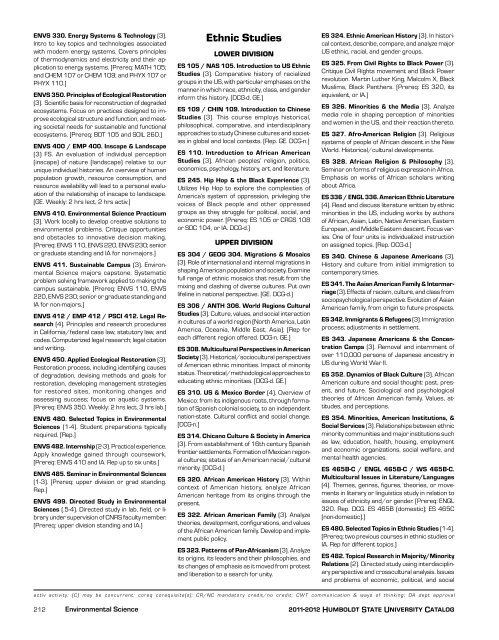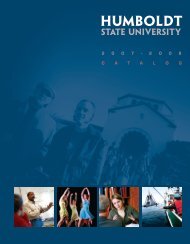2011-12 Academic Year - Bad Request - Humboldt State University
2011-12 Academic Year - Bad Request - Humboldt State University
2011-12 Academic Year - Bad Request - Humboldt State University
Create successful ePaper yourself
Turn your PDF publications into a flip-book with our unique Google optimized e-Paper software.
ENVS 330. Energy Systems & Technology (3).<br />
Intro to key topics and technologies associated<br />
with modern energy systems. Covers principles<br />
of thermodynamics and electricity and their application<br />
to energy systems. [Prereq: MATH 105;<br />
and CHEM 107 or CHEM 109; and PHYX 107 or<br />
PHYX 110.]<br />
ENVS 350. Principles of Ecological Restoration<br />
(3). Scientific basis for reconstruction of degraded<br />
ecosystems. Focus on practices designed to improve<br />
ecological structure and function, and meeting<br />
societal needs for sustainable and functional<br />
ecosystems. [Prereq: BOT 105 and SOIL 260.]<br />
ENVS 400 / EMP 400. Inscape & Landscape<br />
(3) FS. An evaluation of individual perception<br />
(inscape) of nature (landscape) relative to our<br />
unique individual histories. An overview of human<br />
population growth, resource consumption, and<br />
resource availability will lead to a personal evaluation<br />
of the relationship of inscape to landscape.<br />
[GE. Weekly: 2 hrs lect, 2 hrs activ.]<br />
ENVS 410. Environmental Science Practicum<br />
(3). Work locally to develop creative solutions to<br />
environmental problems. Critique opportunities<br />
and obstacles to innovative decision making.<br />
[Prereq: ENVS 110, ENVS 220, ENVS 230; senior<br />
or graduate standing and IA for non-majors.]<br />
ENVS 411. Sustainable Campus (3). Environmental<br />
Science majors capstone: Systematic<br />
problem solving framework applied to making the<br />
campus sustainable. [Prereq: ENVS 110, ENVS<br />
220, ENVS 230; senior or graduate standing and<br />
IA for non-majors.]<br />
ENVS 4<strong>12</strong> / EMP 4<strong>12</strong> / PSCI 4<strong>12</strong>. Legal Research<br />
(4). Principles and research procedures<br />
in California/federal case law, statutory law, and<br />
codes. Computerized legal research; legal citation<br />
and writing.<br />
ENVS 450. Applied Ecological Restoration (3).<br />
Restoration process, including identifying causes<br />
of degradation, devising methods and goals for<br />
restoration, developing management strategies<br />
for restored sites, monitoring changes and<br />
assessing success; focus on aquatic systems.<br />
[Prereq: ENVS 350. Weekly: 2 hrs lect, 3 hrs lab.]<br />
ENVS 480. Selected Topics in Environ men tal<br />
Sci ences (1-4). Student preparations typically<br />
required. [Rep.]<br />
ENVS 482. Internship (2-3). Practical experience.<br />
Apply knowledge gained through coursework.<br />
[Prereq: ENVS 410 and IA. Rep up to six units.]<br />
ENVS 485. Seminar in Environmental Sci ences<br />
(1-3). [Prereq: upper division or grad standing.<br />
Rep.]<br />
ENVS 499. Directed Study in Environmental<br />
Sciences (.5-4). Directed study in lab, field, or library<br />
under supervision of CNRS faculty member.<br />
[Prereq: upper division standing and IA.]<br />
Ethnic Studies<br />
LOWER DIVISION<br />
ES 105 / NAS 105. Introduction to US Ethnic<br />
Studies (3). Comparative history of racialized<br />
groups in the US, with particular emphases on the<br />
manner in which race, ethnicity, class, and gender<br />
inform this history. [DCG-d. GE.]<br />
ES 109 / CHIN 109. Introduction to Chinese<br />
Studies (3). This course employs historical,<br />
philosophical, comparative, and interdisciplinary<br />
approaches to study Chinese cultures and societies<br />
in global and local contexts. [Rep. GE. DCG-n.]<br />
ES 110. Introduction to African American<br />
Studies (3). African peoples’ religion, politics,<br />
economics, psychology, history, art, and literature.<br />
ES 245. Hip Hop & the Black Experience (3).<br />
Utilizes Hip Hop to explore the complexities of<br />
America’s system of oppression, privileging the<br />
voices of Black people and other oppressed<br />
groups as they struggle for political, social, and<br />
economic power. [Prereq: ES 105 or CRGS 108<br />
or SOC 104, or IA. DCG-d.]<br />
UPPER DIVISION<br />
ES 304 / GEOG 304. Migrations & Mosaics<br />
(3). Role of international and internal migrations in<br />
shaping American population and society. Examine<br />
full range of ethnic mosaics that result from the<br />
mixing and clashing of diverse cultures. Put own<br />
lifeline in national perspective. [GE. DCG-d.]<br />
ES 306 / ANTH 306. World Regions Cultural<br />
Studies (3). Culture, values, and social inter action<br />
in cultures of a world region (North Amer ica, Latin<br />
America, Oceania, Mid dle East, Asia). [Rep for<br />
each dif fer ent region offered. DCG-n. GE.]<br />
ES 308. Multicultural Perspectives in American<br />
Society (3). Historical/sociocultural perspectives<br />
of American ethnic minorities. Impact of minority<br />
status. Theoretical/methodological approaches to<br />
educating ethnic minorities. [DCG-d. GE.]<br />
ES 310. US & Mexico Border (4). Overview of<br />
Mexico: from its indigenous roots, through formation<br />
of Spanish colonial society, to an independent<br />
nation-state. Cultural conflict and social change.<br />
[DCG-n.]<br />
ES 314. Chicano Culture & Society in America<br />
(3). From establishment of 16th century Spanish<br />
frontier settlements. Formation of Mexican regional<br />
cultures; status of an American racial/cultural<br />
minority. [DCG-d.]<br />
ES 320. African American History (3). Within<br />
context of American history, analyze African<br />
American heritage from its origins through the<br />
present.<br />
ES 322. African American Family (3). Analyze<br />
theories, development, configurations, and values<br />
of the African American family. Develop and implement<br />
public policy.<br />
ES 323. Patterns of Pan-Africanism (3). Analyze<br />
its origins, its leaders and their philosophies, and<br />
its changes of emphasis as it moved from protest<br />
and liberation to a search for unity.<br />
ES 324. Ethnic American History (3). In historical<br />
context, describe, compare, and analyze major<br />
US ethnic, racial, and gender groups.<br />
ES 325. From Civil Rights to Black Power (3).<br />
Critique Civil Rights movement and Black Power<br />
revolution. Martin Luther King, Malcolm X, Black<br />
Muslims, Black Panthers. [Prereq: ES 320, its<br />
equivalent, or IA.]<br />
ES 326. Minorities & the Media (3). Analyze<br />
media role in shaping perception of minorities<br />
and women in the US, and their reaction thereto.<br />
ES 327. Afro-American Religion (3). Religious<br />
systems of people of African descent in the New<br />
World. Historical/cultural developments.<br />
ES 328. African Religion & Philosophy (3).<br />
Seminar on forms of religious expression in Africa.<br />
Emphasis on works of African scholars writing<br />
about Africa.<br />
ES 336 / ENGL 336. American Ethnic Literature<br />
(4). Read and discuss literature written by ethnic<br />
minorities in the US, including works by authors<br />
of African, Asian, Latin, Native American, Eastern<br />
European, and Middle Eastern descent. Focus varies.<br />
One of four units is individualized instruction<br />
on assigned topics. [Rep. DCG-d.]<br />
ES 340. Chinese & Japanese Americans (3).<br />
History and culture from initial immigration to<br />
contemporary times.<br />
ES 341. The Asian American Family & Intermarriage<br />
(3). Effects of racism, culture, and class from<br />
sociopsychological perspective. Evolution of Asian<br />
American family, from origin to future prospects.<br />
ES 342. Immigrants & Refugees (3). Immigra tion<br />
process; adjustments in settlement.<br />
ES 343. Japanese Americans & the Concentration<br />
Camps (3). Removal and internment of<br />
over 110,000 persons of Japanese ancestry in<br />
US during World War II.<br />
ES 352. Dynamics of Black Culture (3). Afri can<br />
American culture and social thought: past, present,<br />
and future. Sociological and psychological<br />
theories of African American family. Values, attitudes,<br />
and perceptions.<br />
ES 354. Minorities, American Institutions, &<br />
Social Services (3). Relationships between ethnic<br />
minority communities and major institutions such<br />
as law, education, health, housing, employment<br />
and economic organizations, social welfare, and<br />
mental health agencies.<br />
ES 465B-C / ENGL 465B-C / WS 465B-C.<br />
Multicultural Issues in Literature/Languages<br />
(4). Themes, genres, figures, theories, or movements<br />
in literary or linguistics study in relation to<br />
issues of ethnicity and/or gender. [Prereq: ENGL<br />
320. Rep. DCG. ES 465B (domestic); ES 465C<br />
(non-domestic).]<br />
ES 480. Selected Topics in Ethnic Studies (1-4).<br />
[Prereq: two previous courses in ethnic studies or<br />
IA. Rep for different topics.]<br />
ES 482. Topical Research in Majority/Minority<br />
Relations (2). Directed study using interdisciplinary<br />
perspective and crosscultural analysis. Issues<br />
and problems of economic, political, and social<br />
activ activity; (C) may be concurrent; coreq corequisite(s); CR/NC mandatory credit/no credit; CWT communication & ways of thinking; DA dept approval<br />
2<strong>12</strong> Environmental Science<br />
<strong>2011</strong>-20<strong>12</strong> <strong>Humboldt</strong> <strong>State</strong> <strong>University</strong> Catalog

















